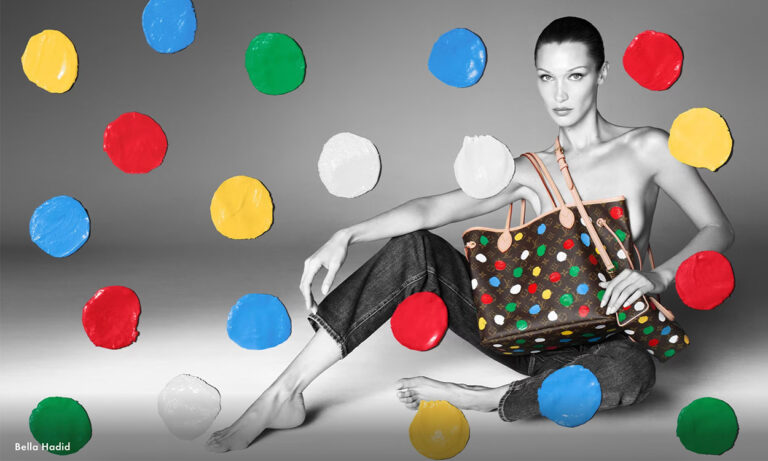Yayoi Kusama’s collaboration with Louis Vuitton speaks volumes about the industry’s lack of integrity

Fashion is no stranger to controversy. From child endangering Balenciaga campaigns, to the questionable attitudes of Karl Lagerfield, the industry is never too far from an overhead storm. The latest perpetrator? Louis Vuitton. The French luxury brand’s latest collaboration with legendary Japanese artist Yayoi Kusama reminds us that money seems to do a lot more talking than integrity.
Kusama’s influence is everywhere. The 93-year-old is best known for her polka dot pumpkins and manic avant-garde shows, as well as the ever popular selfie baiting infinity room that permanently resides at the Tate Modern. Kusama has had a turbulent life, one plagued with mental health difficulties and instability—her art is a direct reflection of her own mind.
The most expensive female artist alive is a sympathetic figure, but it’s worth knowing that the artist has said some problematic things in the past, especially pertaining to race. Why do so many choose to overlook this sort of behaviour? And why does a house that tries to be as progressive as Louis Vuitton feel it appropriate to collaborate with her?
In the aforementioned artist’s 2002 autobiography, passages reveal a painfully simplistic and reductive view of race, and an unfortunately narrow world view. In the book black people are subjected to appearing as “exotic” or “primitive” creatures. Passages talk of how Kusama marvelled at “distinctive smells” and “animalistic sex techniques.”
Even worse, is another passage that has the artist lamenting over the fact that real estate prices have declined in Greenwich Village where she used to live, “falling by $5 a day” because “black people are shooting each other out front” and that the area has degenerated into “slums.” An article from Vice in 2017 points out that this passage is present in the Japanese version only, and was omitted from English versions of the text—a move that highlights just how incredibly offensive and discriminatory these attitudes are.
The article from Vice makes another point against the troubled artist, in that their interview with the artist was cut short after Kusama seemed to not like the questions she was asked by journalist Dexter Thomas. The reporter was left “wondering if my own blackness might have played some small role in Kusama’s assumption that I did not understand her art and was thus unfit to interview her.”
I appreciate that Kusama has her own difficulties, and at the time she was 88-years-old. Who’s to say how much of the language she used or views she held were a result of her mental health, but all the same does that excuse it?
I’m truly baffled at how a house as seemingly progressive as Louis Vuitton came to partner with Kusama? Don’t forget that LV was the first of the fashion giants to appoint the late Virgil Abloh—a black American—as creative director.
Kusama doesn’t need to be cancelled or have her reputation destroyed—just maybe footnoted? Ultimately I wish fashion houses would think ethically and consciously when it comes to collaborations like this. The works of the Japanese artist will stand the test of time, regardless of whether or not we see her art replicated on the side of a LV handbag. Is there nobody else that LV could have championed with a collaboration? Black artists like Lubaina Himid or Chéri Samba for example would’ve been a well-received move.
We could have seen any number of artists championed in a meaningful way—one that paid the wealth forward, and not backwards. That being said, after a lul in profits in the fashion sector thanks to the pandemic, I imagine the big dogs at LVMH—Louis Vuitton’s parent company—were eager to begin lining their pockets again. Kusama is a guaranteed win, a reflection of the drought in integrity evident in even some of the most progressive of houses.




